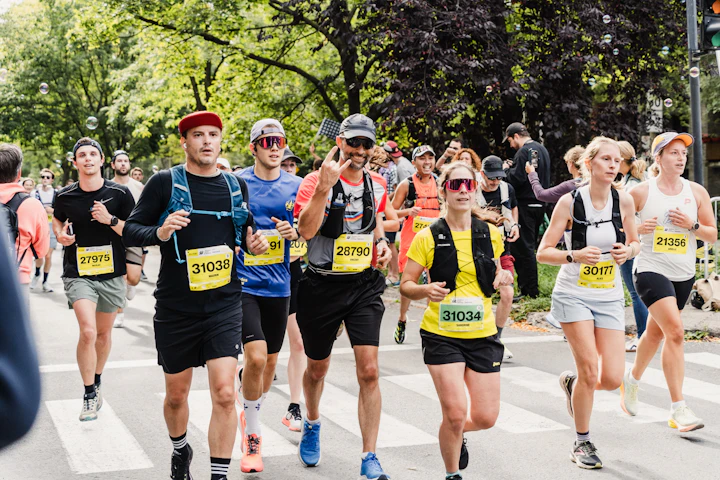
6 min read
Summary
What is the average time on the half-marathon distance?
What is the average pace on a half-marathon in kilometers per hour?
How to estimate your time on a half-marathon?
What time to aim for based on your 10 km time?
Can you estimate your time from your MAS?
Estimate your time using the Campus pace calculator
How to calculate your running pace on a half-marathon?
Why do we prefer to use pace in min/km rather than speed in km/h?
What is the method to calculate the average pace on a half-marathon?

Receive advice from our passionate coaches!
Whether it's your first experience in a half-marathon or you're an experienced runner, to properly prepare for an endurance event such as the half-marathon, it's very helpful to know your paces and split times. We're going to explain the means to get a good estimate of your time and how to calculate your pace over this distance.
What is the average time on the half-marathon distance?
To give you an idea, the average time to complete the 21.095 kilometers of the half-marathon is around 2 hours and 15 minutes of effort, considering a range of runners worldwide. Moreover, we have dedicated a full article on the subject. You will discover notably that this average time is reduced by nearly thirty minutes among our users. Indeed, our extensive running study revealed that this time decreases to 1 hour and 47 minutes for Campusians, across genders and ages.
What is the average pace on a half-marathon in kilometers per hour?
A time of 2 hours in a half-marathon corresponds to an average speed of 10.04 km/h. Achieving this performance is quite an accomplishment. For the average time on a half-marathon, which is 2 hours and 15 minutes, this gives a pace of 6 minutes and 23 seconds per kilometer, or 9.38 km/h. This benchmark helps to position where the best runners on the planet are. The world record holder for the distance, Jacob Kiplimo, ran at an average speed of over 22 km/h when he set his record (57 minutes and 31 seconds). The top female on the distance, Letesenbet Gidey, exceeded an average of 20 km/h to set the world record in 1 hour 2 minutes and 52 seconds. Vertiginous!

How to estimate your time on a half-marathon?
There are several methods, more or less precise, to estimate your potential time on a half-marathon. Most of these estimation methods are based on your best performance achieved in competition over a shorter distance, ideally over 10 kilometers.
What time to aim for based on your 10 km time?
To make an estimation of your half-marathon time from a 10 km time, you can use the formula of multiplying your most recent Personal Record (in minutes) achieved over 10 kilometers by 2.2. For example, you have a personal record of 50 minutes per 10 kilometres. Do the following calculation: 50 x 2.2 = 110. You get a realistic estimate of 1 hour 50 minutes for a half-marathon. This is contingent upon serious and specific training to maintain the race distance. You can lower the coefficient to 2.1 if you train a lot or increase it to 2.25 if your training volume is low and you have little experience.
Can you estimate your time from your MAS?
Sometimes, time projections are made based on maximal aerobic speed. In reality, this method is unreliable. It involves having accurately assessed your MAS with a time support test. Furthermore, the MAS is far from being the only predictor of running performance. As distances increase, other factors such as the endurance index (the percentage of MAS you can maintain over a given time) and the economy of running play a crucial role. As a result, two athletes with the exact same MAS score after a Vameval test won't necessarily achieve the same time on a half-marathon. Depending on the other mentioned factors, their half-marathon pace may vary between 80 and 85% of their MAS, making a big difference in the end. Very high-level athletes can maintain nearly 90% of their MAS over a half-marathon.
Estimate your time using the Campus pace calculator
The simplest method to estimate your half-marathon time is to use our pace calculator. This calculator allows you to project over different distances.
If your Personal Record is 50 minutes over 10 kilometers, the calculator gives a time of 1 hour 50 minutes and 19 seconds on a half. This time decreases to 1 hour 48 minutes if you decide to follow a 12-week Campus training plan. It is reduced to 1 hour 45 minutes and 28 seconds by following a 24-week training plan. This aligns with our training philosophy: the longer your preparation (and thus the time dedicated to a work that is both progressive and specific, in this case for the half-marathon), the more consistent your performance, the more likely you are to maximize your potential on the race day.
How to calculate your running pace on a half-marathon?
If you prefer to do the calculations for your potential half-marathon pace yourself, you're in the right place: we’ll explain how to proceed here.
Why do we prefer to use pace in min/km rather than speed in km/h?
It is easier to handle a pace in min/km than a speed in km/h. Pace is simply the number of minutes and seconds you take to cover a kilometer. For example, a 10-kilometer run in 50 minutes allows you to instantly calculate your pace: 5 minutes per kilometer. Pace is much more practical than speed for having consistent benchmarks, whether in training or during a race.

What is the method to calculate the average pace on a half-marathon?
There is a very simple formula to calculate your average pace on a half-marathon: divide the time you aim for on the distance (in minutes) by the exact distance of the half, which is 21.095 kilometers.
For example, if you aim for a time of 2 hours, that is 120 minutes, perform the following calculation: 120 / 21.095 = 5.688. Then, convert the decimals to seconds: 0.688 x 60 = 41.
You then get a pace of 5 minutes and 41 seconds for a time of 2 hours on a half-marathon.
To give you references and make an estimation of your half-marathon time, here is a table of correspondence between the time aimed for on half and the average pace in min/km.
| Half-marathon time | Average pace (min/km) |
|---|---|
2:15 | 6'23" |
2:10 | 6'09" |
2:05 | 5'55" |
2:00 | 5'41" |
1:55 | 5'27" |
1:50 | 5'12" |
1:45 | 4'58" |
1:40 | 4'44" |
1:35 | 4'30" |
1:30 | 4'16" |
1:25 | 4'01" |
1:20 | 3'47" |
1:15 | 3'33" |
Now that you know how to estimate your half-marathon time, you will have to work on your average pace in training over increasingly longer intervals until you know it by heart (yes, there are no magic formulas). It's an essential step if you want to perform your best on race day. Moreover, remember that starting above the race pace you've practiced in training (and thus likely above your current physical and mental strength) will very likely result in a significant loss of speed during the second half of your race. Hence the importance of having your pace well in mind and trying to adhere to it meticulously.

Antoine
share

Receive advice from our passionate coaches!
FAQ
🕒 Comment convertir des minutes en heures pour calculer mon temps de course ?
🕒 Comment convertir des minutes en heures pour calculer mon temps de course ?
Convertir des minutes en heures est simple :
Divise le nombre total de minutes par 60.
Le chiffre avant la virgule correspond aux heures.
Multiplie les décimales par 60 pour obtenir les minutes restantes.
Exemple : 95 minutes → 95 ÷ 60 = 1,58 h puis 0,58 × 60 = 35 minutes → donc un total de 1h35.
⏱️ Comment convertir des heures en minutes ?
⏱️ Comment convertir des heures en minutes ?
La formule est simple :
Nombre de minutes = Nombre d’heures × 60
Par exemple, pour convertir 3,25 heures en minutes :
3,25 × 60 = 195 minutes
⏱️ Comment convertir mon allure en min/km en km/h ?
⏱️ Comment convertir mon allure en min/km en km/h ?
Pour convertir ton allure en min/km, il te suffit de :
Diviser 60 par ton allure en minutes/km.
Exemple : 5 min/km → 60 ÷ 5 = 12 km/h.
Bien qu'en course à pied, on utilise plutôt la métrique min/km
⏱️ Pourquoi a-t-on besoin de convertir les heures en minute dans le cadre de l'entraînement ?
⏱️ Pourquoi a-t-on besoin de convertir les heures en minute dans le cadre de l'entraînement ?
La conversion des heures en minutes est cruciale pour :
planifier des séances d'entraînement avec précision
analyser les performances sur des segments de temps spécifiques
gérer le temps de récupération entre les exercices
comparer les durées de différentes séances et types d'entraînement





